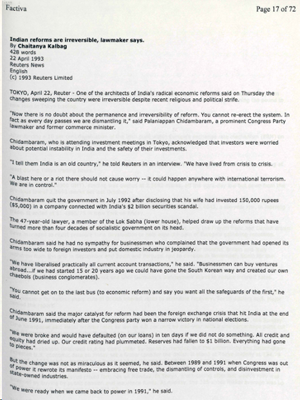Indian reforms are irreversible, lawmaker says
[Reuters]
Published date: 22nd Apr 1993
22 April 1993
Reuters News
English
(c) 1993 Reuters Limited
TOKYO, April 22, Reuter – One of the architects of India’s radical economic reforms said on Thursday the Changes sweeping the country were irreversible despite recent religious and political strife.
“Now there is no doubt about the permanence and irreversibility of reform. You cannot re-erect the system. In fact as every day passes we are dismantling it,” said Palaniappan Chidambaram, a prominent Congress Party lawmaker and former commerce minister.
Chidambaram, who is attending investment meetings in Tokyo, acknowledged that investors were worried about potential instability in India and the safety of their investments.
“I tell them India is an old country,” he told Reuters in an interview. “We have lived from crisis to crisis.
“A blast here or a riot there should not cause worry — it could happen anywhere with international terrorism. We are in control.”
Chidambaram quit the government in July 1992 after disclosing that his wife had invested 150,000 rupees ($5,000) in a company connected with India’s $2 billion securities scandal.
The 47-year-old lawyer, a member of the Lok Sabha (lower house), helped draw up the reforms that have turned more than four decades of socialistic government on its head.
Chidambaram said he had no sympathy for businessmen who complained that the government had opened its arms too wide to foreign investors and put domestic industry in jeopardy.
“We have liberalised practically all current account transactions,” he said. “Businessmen can buy ventures abroad … if we had started 15 or 20 years ago we could have gone the South Korean way and created our own chaebols (business conglomerates).
You cannot get on to the last bus (to economic reform) and say you want all the safeguards of the first,” he said.
Chidambaram said the major catalyst for reform had been the foreign exchange crisis that hit India at the end of June 1991, immediately after the Congress party won a narrow victory in national elections.
We were broke and would have defaulted (on our loans) in ten days if we did not do something. All
credit and equity had dried up. Our credit rating had plummeted. Reserves had fallen to $1 billion. Everything had gone to pieces.”
But the change was not as miraculous as it seemed, he said. Between 1989 and 1991 when Congress was out of power it rewrote its manifesto — embracing free trade, the dismantling of controls, and disinvestment in state-owned industries.
“We were ready when we came back to power in 1991,” he said.
(c) Reuters Limited






